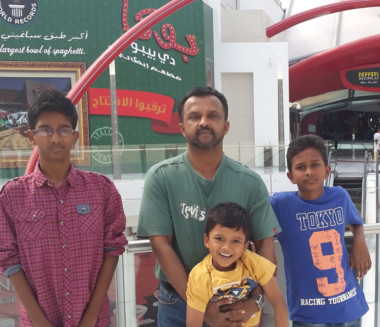
Dubai: In a recent edition of the Denmark-based Lego Club magazine, it ran an article featuring beauty tips for five-year-old girls. It gave them insights into what haircut would suit the shape of their face. It went on to give them tips on how to look more attractive. At such a young age, could being exposed to such information influence children negatively?
We speak to Gulf News reader Shabir Zain Al Deen about how hard is it for him to raise children in a time of over-exposure.
Al Deen, a librarian based in Dubai, is a father of three sons, aged fifteen, eleven and six.
He said: “It is challenging to be raising three children in a world where information is easily available. Striking a balance is what is needed since we cannot avoid advanced technology; it is a necessary component of life that we have to live with in this modern age. We need to think like children and find the border line to prevent them from accessing incorrect or inappropriate information.”
In a world of over-exposure, children are constantly bombarded with information, be it in the form of social media, traditional news channels, online chat forums or even magazines.
Zain Al Deen said: “The media reports on a lot of issues on a daily basis and this has an impact on children. For example, a few years ago, there were several reports on Sri Lanka’s civil war and every time we visited, my children were very scared of leaving our home. It puts us in a difficult situation. Even stories that are not related to political situations affect them. Things such as cartoons on television contain adult content, which is inappropriate for children. The media industry should have self-censorship. Companies need to sell their products and often won’t mind if their target audience is children. They cater their stories, advertisements and campaigns at children, so they ask their parents to buy them the products or let them get the latest gadgets. But there is a need for restrictions.”
When asked if technology was making life easier or harder for parents, Zain Al Deen was positive.
He said: “When we were younger, we had to look for information in books, ask teachers or visit libraries. Now, such information is available at your fingertips, provided you know how to filter it. As a librarian working for a university, I know how information technology is helping the academic community in their information-seeking needs and behaviour. It has made life easier for parents and teachers.
“For example, if a student needs to understand a concept or how a piece of equipment works, he or she does not need to turn the pages of a book, but can use the internet to find a video to easily grasp the fundamentals. My children use self-help websites, which in turn helps parents, saves their time and offers a better and more accurate explanation.”
Zain Al Deen’s six-year-old is also aware of how to use the latest gadgets. But, this doesn’t concern her father.
He said: “He is mature in that way. He is good at painting and he uses a tablet device to practice. We keep an eye on his usage. Technology and modern gadgets are like a sharp knife; if you use it right, you will get greater results.”
He calls the latest gadgets a ‘necessary evil’.
He said: “Without them, children will not know how technology is evolving. If you don’t allow them to use gadgets, they become ‘information-illiterate’. However, parents need to be cautious and constantly inspect what their children read, and monitor them. In many schools and universities, gadgets have been made compulsory. It helps students understand the subject by using videos, graphs, pictures and animations rather than reading a printed book. It is more interactive.”








